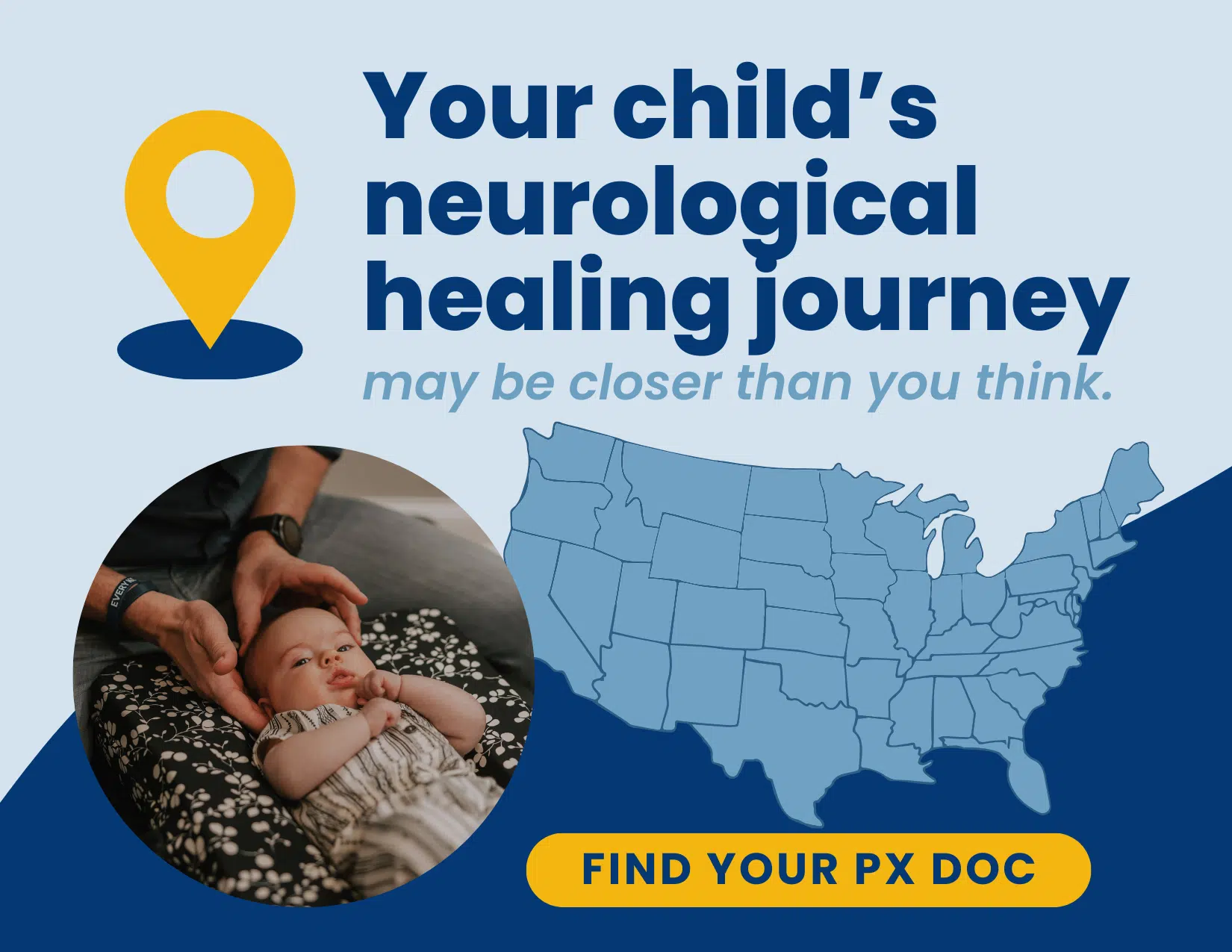As parents, it’s heartbreaking to watch our children struggle with mental, emotional, or behavioral challenges. We want to see them thrive and live happy, healthy lives. But when these difficulties arise, it can be confusing and overwhelming to navigate the sea of information and opinions on what causes these issues and how best to address them.
For years, the prevailing belief has been that a chemical imbalance in the brain is the primary culprit behind conditions like anxiety, depression, ADHD, and other behavioral disorders in children. This theory, also called the monoamine deficiency theory, has led to a heavy reliance on medication as the go-to solution. But what if there’s more to the story?
At PX Docs, we believe that the chemical imbalance theory is just one piece of a much larger puzzle. Our approach focuses on identifying and addressing the root causes of these challenges, looking beyond brain chemistry to the intricate connections between the brain, nervous system, and overall health.
In this article, we’ll explore the myths and realities surrounding chemical imbalances, the factors contributing to nervous system dysregulation, and the transformative power of a holistic, neurologically-focused approach to pediatric health.
The Chemical Imbalance in the Brain Theory: Debunking the Myth
For decades, the chemical imbalance theory has been the dominant explanation for mental health disorders, suggesting that a deficiency in neurotransmitters causes conditions like anxiety and depression from a chemical imbalance. But what exactly is a chemical imbalance?
In simple terms, a chemical imbalance refers to a situation with too much or too little of certain neurotransmitters in the brain, such as serotonin, dopamine, or norepinephrine. These neurotransmitters are crucial in regulating mood, emotions, and cognitive function.
The chemical imbalance theory gained traction in the late 1950s when researchers discovered that certain medications, such as monoamine oxidase inhibitors (MAOIs) and tricyclic antidepressants (TCAs), could alleviate symptoms of depression by increasing the concentration of neurotransmitters in the brain. This led to the hypothesis that a deficiency in these chemicals could be the underlying cause of mental health disorders.
However, as our understanding of the brain and mental health has evolved, it’s become clear that these medications often fail to help neurological conditions in children because the chemical imbalance theory has significant limitations and misconceptions:
- There is no reliable way to measure neurotransmitter levels in the living brain, making it difficult to determine if an imbalance exists
- Many factors, including genetics, environment, and life experiences, contribute to the development of mental health disorders
- Antidepressants that target neurotransmitters can take weeks or months to produce noticeable effects, suggesting that their mechanism of action is more complex than simply correcting a chemical imbalance
While neurotransmitters undoubtedly play a role in chemical imbalance, it’s essential to recognize that their function is just one part of a much larger, intricate system. Mental health disorders are multifaceted, involving a complex interplay of biological, psychological, and social factors.
Further, by oversimplifying these conditions and attributing them solely to a chemical imbalance, we risk overlooking the true root causes and the importance of a holistic approach to treatment.
What Causes Depression? Understanding “The Perfect Storm” of Factors Contributing to Neurological Dysfunction
At PX Docs, we often refer to “The Perfect Storm” when discussing the root causes of mental, emotional, and behavioral disorders in children. This concept recognizes that these challenges rarely arise from a single cause but rather from a combination of factors that accumulate over time, disrupting the delicate balance of the developing brain and nervous system.
One of the earliest elements of this Perfect Storm can occur during pregnancy. Maternal stress, anxiety, and trauma can have a profound impact on fetal brain development. This is because when a mother experiences chronic stress, her body releases high levels of cortisol. This cortisol can then lead to changes in neurotransmitter systems, making the child more susceptible to mental health challenges, such as anxiety disorders, later in life.
The birth process itself can also contribute to neurological dysfunction. Birth interventions, such as forceps delivery, vacuum extraction, or cesarean section, can cause physical trauma to the delicate structures of the head, neck, and spine. This trauma can result in subluxations, or misalignments, in the neuromusculoskeletal system, which can interfere with proper nerve function and communication between the brain and body.
Other factors that can contribute to “The Perfect Storm” include:
- Nutritional deficiencies and poor gut health
- Environmental toxins and pollutants
- Sedentary lifestyle and lack of physical activity
- Excessive screen time and social media use
- Sleep disturbances and chronic sleep deprivation
As these stressors accumulate, they can overwhelm the body’s natural ability to maintain balance and resilience. The result is a state of neurological dysfunction characterized by an overactive stress response, imbalanced neurotransmitter levels, and impaired communication between the brain and body.
Fortunately, understanding “The Perfect Storm” and its factors can help us develop a comprehensive approach to addressing the root causes of chemical imbalance, causing mental, emotional, and behavioral disorders in children.
The Neurospinal System and Gut-Brain Connection
The nervous system is the master controller of the body, regulating every function from movement and sensation to mood and cognition. At the center of this intricate network is the neurospinal system, which includes the brain, spinal cord, and the vast array of nerves that extend throughout the body.
When the neurospinal system functions optimally, it allows for clear communication between the brain and body, enabling the body to adapt and respond to its environment effectively. However, when neurological misalignments occur due to external factors, they can disrupt this communication. This can then lead to a wide range of health challenges, including mental, emotional, and behavioral disorders.
Studies have linked imbalances in the gut microbiome, such as those caused by poor diet, stress, or antibiotic use, with disrupted communication between the neural pathways, contributing to neurological dysfunction.
However, by addressing subluxations and supporting gut health through targeted interventions, such as Neurologically-Focused Chiropractic Care, balance can be restored to the neurospinal system, improving the brain-body connection.
Foundational Health Functions to Prevent Chemical Imbalance
In addition to the neurospinal system and gut-brain connection, several foundational health functions are critical in promoting mental and emotional well-being and preventing chemical imbalance. These include:
- Sleep: Quality sleep is essential for brain health, allowing for the consolidation of memories, the clearance of toxins, and the regulation of neurotransmitters. Chronic sleep deprivation can lead to imbalances in mood, cognition, and behavior.
- Nutrition: A nutrient-dense, whole-foods diet provides the building blocks for healthy brain function, while processed and inflammatory foods can contribute to neurological dysfunction.
- Exercise: Regular physical activity has been shown to improve mood, reduce stress, and promote the growth of new brain cells. It also supports healthy circulation and oxygenation of the brain.
- Stress Management: Incorporating stress-management techniques, such as mindfulness, deep breathing, and time in nature, can help promote resilience and balance.
By optimizing these foundational health functions, we can create a supportive environment for the brain and nervous system to thrive and reduce the risk of mental, emotional, and behavioral disorders.
Neurologically-Focused Chiropractic Care: A Drug-Free Approach for Addressing Chemical Imbalance
At PX Docs, we specialize in Neurologically-Focused Chiropractic Care, a precise and effective approach to supporting healthy nervous system function. Our care focuses on identifying and correcting subluxations restoring proper alignment and communication within the neurospinal system.
This drug-free approach is effective in addressing a wide range of neurodevelopmental challenges, including:
- Attention Deficit Hyperactivity Disorder (ADHD)
- Autism Spectrum Disorder (ASD)
- Sensory Processing Disorder (SPD)
- Anxiety and Mood Disorders
- Behavioral and Emotional Regulation Challenges
By combining Neurologically-Focused Chiropractic Care with lifestyle interventions that support foundational health functions, we help children achieve lasting improvements in their mental, emotional, and behavioral well-being.
Empowering Parents and Collaborative Care
The conventional belief that mental, emotional, and behavioral disorders in children are caused solely by a chemical imbalance in the brain is a myth that overlooks the complex interplay of factors that contribute to neurological dysfunction.
By understanding “The Perfect Storm,” the role of the neurospinal system and gut-brain connection, and the importance of foundational health functions, parents and qualified, neurologically-focused pediatric chiropractors can work together to develop a root-cause approach to supporting children’s mental and emotional well-being.
If you suspect that your child may be struggling with a chemical imbalance presenting as a mental, emotional, or behavioral disorder, we encourage you to visit a PX Docs chiropractor for a thorough evaluation and personalized care plan. Together, we can help your child unlock their full potential and thrive.





